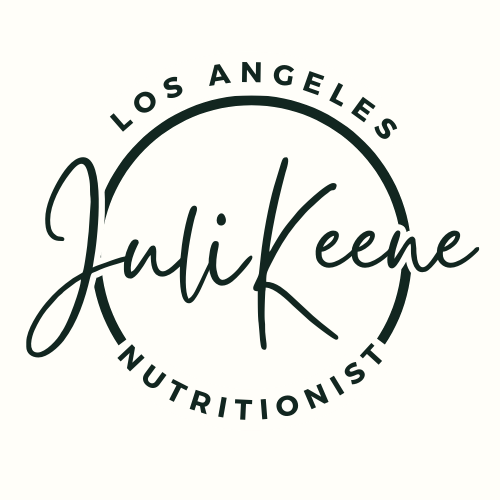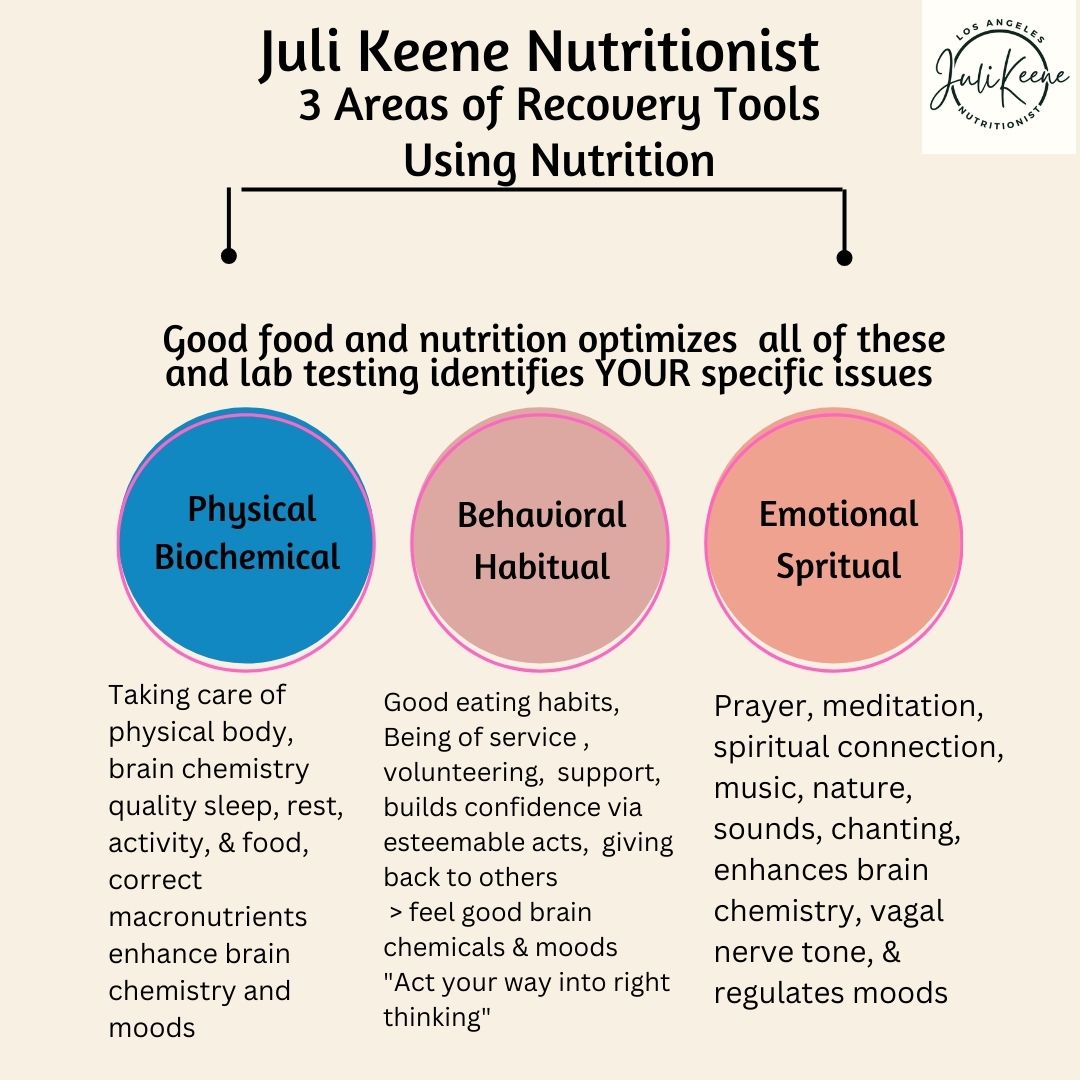Finding True Balance: Nutrition, Recovery, and Thriving in Sobriety
Recovery is about much more than simply stopping an addictive behavior. It’s a journey to finding balance physically, mentally, emotionally, and spiritually. For over 26 years as a Clinical Nutritionist, I’ve helped clients navigate this journey, empowering them to optimize their health and well-being. My approach is tailored to those in recovery from addiction (including alcoholism), integrating cutting-edge nutrition science, personalized strategies, and a deep respect for the unique challenges of sobriety.
Unlike standard nutrition programs that rely on calorie counting or fad diets, I focus on creating personalized nutrition plans based on macronutrient balance, nutrient density, and real food. Whether you’re tackling sugar cravings, mood swings, or post-addiction health issues, we uncover solutions by diving deep into your biochemistry, genetics, and health history. Add in functional lab testing blood, saliva, hormone, or food sensitivity panels and we build a plan that supports your recovery, optimizes mood, and boosts your overall vitality. We can also add supplements and amino acids which are commonly needed in the recovering community.
Beyond the Basics: Why Nutrition is Critical in Recovery
When you’re in recovery, food isn’t just something to do or something to fix with for what may feel like hunger but often is not. Food is fuel it’s the very foundation of your thoughts and moods because nutrients are critical to healthy neurotransmitters and brain function Julia Ross, The author of The Mood Cure goes deep into this in her groundbreaking book that is still a staple for me in my practice. What you eat directly impacts your moods, energy levels, and ability to stay balanced. Many people in recovery face hurdles like sugar cravings, low energy, or emotional instability. A personalized food and supplement plan can make all the difference. I’ve seen people completely transform their moods, recovery and life with the right nutrients through diet and supplement changes.
I’ve also seen the power of combining 12-step recovery programs with customized nutrition plans. Clients who embrace this approach often maintain sobriety for decades while stopping the generational cycle of addiction. Personally, I know the profound impact this has on familie. I’m beyond grateful that while I grew up with addicted parents, my child has never seen me partake in the addictive behaviors of my past. Breaking the cycle starts with us. You can end the cycle now if you choose to.
Recovery for Real Life
Living in Los Angeles, I’ve worked with a diverse group of clients: actors, professional athletes, musicians, and regular people committed to transformation. Recovery isn’t about deprivation; it’s about creating a sustainable lifestyle. Whether it’s helping an actor achieve a body transformation for a role or supporting a mom in recovery regain her health, my goal is the same: empower clients with the tools to thrive.
Together, we explore practical strategies to tackle addictive patterns. Using my custom tracking tools and Practice Better Nutrition app, you’ll gain awareness of behaviors and habits around food and alcohol, giving you the clarity to make sustainable changes. Group Programs provide an affordable, community-focused option, while my Private Deep Dive Packages work for most people, my Elite Concierge Programs offer personalized, one-on-one attention for those who need maximum support. The Red Carpet Elite plans are not for everyone but for those who don’t have time to spend on Nutrition we will work with your staff to get you up and on a plan and to your results ASAP while you focus on your zone of genius.
A Biochemical Approach
Addiction recovery isn’t one-size-fits-all, and many people struggle when mental health or biochemical issues go untreated. That’s why I prioritize lab testing to uncover what’s really going on beneath the surface. From custom blood panels to microbiome testing, I leave no stone unturned in identifying the imbalances that might be affecting your mood, energy, or cravings.
These tests help me design nutrition and supplement strategies that support your body’s unique needs. For some, it’s about balancing blood sugar to prevent emotional crashes. For others, it might be stabilizing hormones or addressing gut health to improve mental clarity. The result? You feel better faster and stay on track for the long term. In our Follow Up sessions we can fine tune your plans and retest labs to mark your progress and have a heads up if you start to back track.
The Role of Spirituality in Recovery
One of the most important aspects of recovery is finding a connection to something greater than ourselves. While I encourage clients to explore spiritual practices that resonate with them, whether it’s mindfulness, nature walks, prayer, or meditation I also deeply respect the role of 12-step programs like Alcoholics Anonymous (AA), Cocaine Anonymous, Narcotics Anonymous, Overeaters Anonymous, Food Addicts Anonymous and more. These programs have helped countless numbers of people find freedom through their principles of honesty, accountability, group fellowship and support, gratitude, and service to others.
Unlike many modern “recovery coaches” or for-profit models that lack substance, AA’s non-profit, community-driven approach continues to thrive because it works. As a nutritionist, I focus on the biochemical and physical aspects of recovery, leaving the spiritual and emotional work to the experts in 12-step programs.
The Pandemic, Addiction, and the Modern Food Crisis: A Deeper Look
The COVID-19 pandemic revealed and amplified a growing crisis in addiction and unhealthy behaviors. Emotional eating, excessive drinking, and increased marijuana use became coping mechanisms for many. At the same time, countless individuals who relied on the support of 12-step programs found themselves disconnected, leaving them struggling to regain their footing. This collective upheaval resulted in weight gain, sugar addiction, and an increased reliance on medications like Wegovy, Ozempic, and Tirzepatide (Mounjaro) for weight loss.
While these medications have undeniably helped many achieve significant weight loss and may even hold potential in addressing addictions and alcoholism (a topic deserving its own discussion but not here and now) they do not address the root causes of our health crises. Instead, we must examine how decades of bad nutrition policy, false healthy habits, and deliberate misinformation have brought us to this point.
The Lies That Fuel the Cycle
The torturous cycle of dieting, regaining weight, and dieting again stems from systemic issues. Poor nutrition advice, heavily influenced by the food industry, has encouraged Americans to feed themselves and their children highly palatable, ultra-processed foods marketed as convenient and even “healthy.” These foods, laden with refined sugars, unhealthy fats, and chemical additives, create blood sugar spikes, drive cravings, and lead to overeating. In short, they keep us addicted.
Examples of these deceptive products are everywhere: sugary cereals marketed as “whole grain, and “a healthy breakfast” granola bars packed with sugar, processed macaroni and cheese, snack foods like Pirate’s Booty, and even oatmeal that’s essentially candy in disguise. These are not real foods. They are engineered for profit, not health.
Meanwhile, professionals in the nutrition and healthcare space, including Registered Dietitians and therapists, are often taught using materials funded or influenced by the food industry itself. This education perpetuates the belief that recommending real food lean proteins, whole vegetables, complex carbs, and healthy fats is somehow “dangerous” and might trigger eating disorders. This logic is not only flawed but also harmful.
Suggesting that cutting out ultra-processed junk food could harm children or teens is like saying limiting screen time will damage their creativity. It is a convenient narrative for companies profiting from the food addiction cycle. This falsehood reminds me of the manipulation portrayed in House of Cards, where Kevin Spacey’s character shapes public perception to serve his agenda. The same tactics are at play here. Only this time, they’ve created a reality where the food industry profits from our collective health decline.
Not only do we continue consuming these fake foods, creating endless profits, but we are also diving deeper into the search for diets, drugs, or miracle products to “fix” the extra weight, chronic conditions, and diseases of middle and old age. These are most certainly, in large part, a result of poor and misguided diets.
The Fight for Real Food
Most Americans want to do the right thing when it comes to their health. They trust the information they’re given and follow the advice provided by so-called experts, but they’re set up to fail from the start. The overwhelming presence of processed, addictive foods combined with misleading nutrition education keeps the cycle alive and well.
This reality drives my work and has been the foundation of my career for nearly 30 years. It also fuels my upcoming book, Fueling Recovery and the E.D.I. Guidebook. This guide will provide clear, actionable strategies to break free from the toxic cycle of addiction and poor nutrition, helping individuals reclaim their health, well-being, and lives.
It is time to reject the lies, embrace real food, and fight for the right to live in a society where our diets nurture rather than harm us. Together, we can work toward a future of better health and freedom from food and substance addiction.
These challenges require holistic solutions physical, biochemical, mental, and spiritual. My practice takes a deep dive into each of these areas to create personalized strategies that empower clients to rebuild their health and confidence.
My Recovery Journey
With over 35 years in active recovery, I’ve experienced firsthand the transformation that comes from combining nutrition, spiritual growth, and 12-step principles. I don’t have all the answers, but I’m constantly learning and committed to helping others find their own path to freedom.
For those ready to embrace change, I’ll soon release my Recovery Fuel Guidebook, a book designed to help anyone in recovery incorporate proper nutrition into their lifestyle. Because when we eat better, we feel better and when we feel better, sobriety becomes easier to maintain.
As I often say, “We didn’t get sober to feel like crap!”
Ready to Begin?
If you’re ready to take the next step in your recovery journey, I’d love to help. Whether it’s through private consultations, group programs, or simply using my tools and resources, we’ll work together to build a life of health, balance, and freedom.

